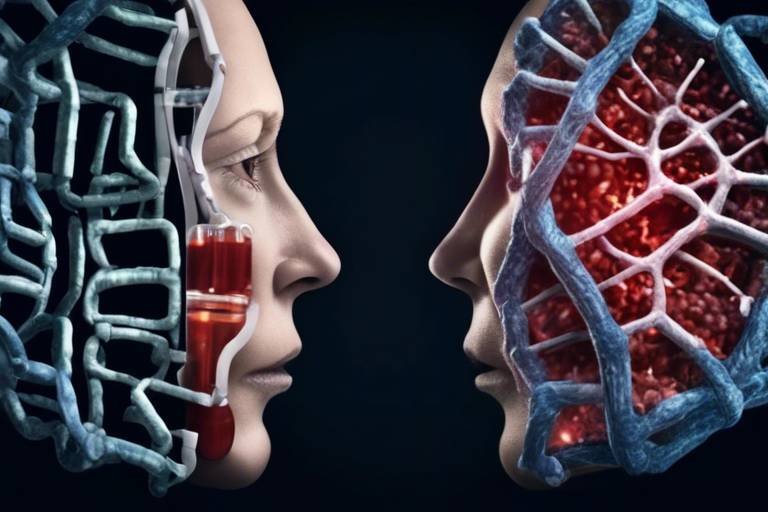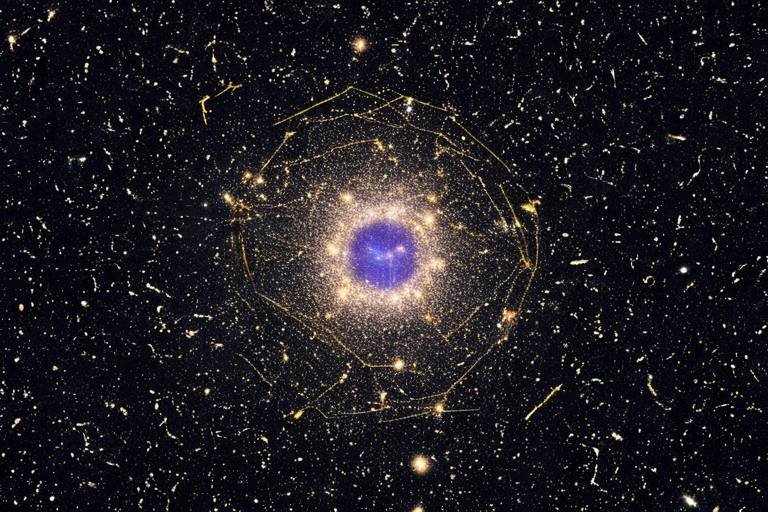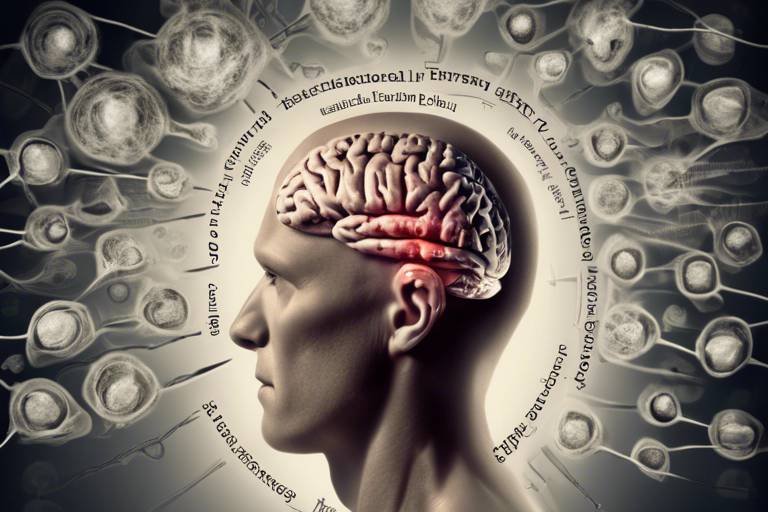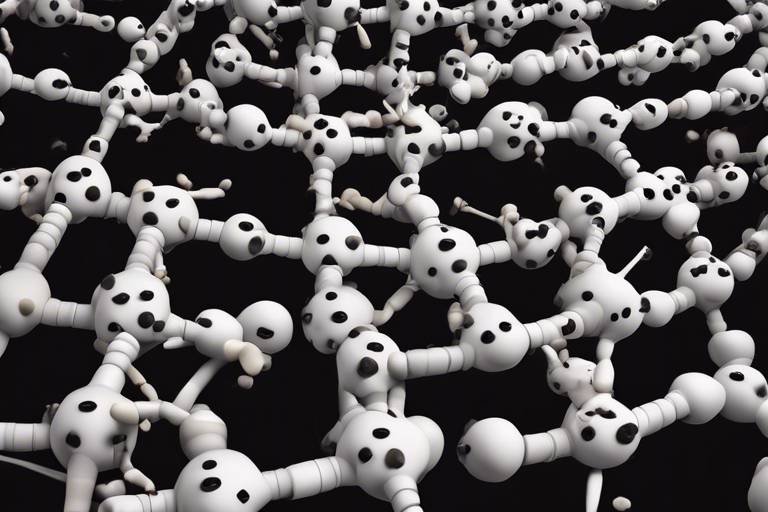The Sense of Self - The Philosophical Debate in Neuroscience
The intricate relationship between neuroscience and the philosophical concept of self is a topic that has captivated thinkers for centuries. As we dive into this exploration, we find ourselves at the crossroads of science and philosophy, where questions about identity, consciousness, and the essence of being come to the forefront. Have you ever pondered what truly makes you, *you*? Is it your memories, your thoughts, or perhaps something deeper? This article aims to unravel these complexities, shedding light on how scientific advancements are reshaping our understanding of self and identity.
What exactly constitutes the self? This question has been a cornerstone of philosophical inquiry. Various philosophical perspectives, from Descartes' "I think, therefore I am" to Buddhist notions of anatta, challenge our understanding of identity. Neuroscience has stepped into this debate, providing fascinating insights that intersect with these philosophical ideas. For instance, consider how our personal experiences shape our sense of self. The continuity of identity over time raises profound questions: Are we the same person we were a decade ago? Or does our self evolve with every new experience? The dialogue between philosophy and neuroscience enriches our understanding, prompting us to reflect on the very nature of existence.
Advancements in neuroscience have significantly influenced how we perceive identity. The human brain is a complex organ, and its functioning can dramatically alter one's sense of self. For example, brain injuries or neurological disorders can lead to profound changes in personal narratives. Imagine waking up one day with no recollection of your past—how would that redefine who you are? This interplay between brain function and identity is not just a theoretical discussion; it has real-world implications for individuals experiencing such conditions.
Memory is a crucial component in shaping our identity. It serves as the thread that weaves together our experiences, allowing us to maintain a sense of continuity over time. Neurological studies reveal a fascinating connection between memory formation, recall, and the continuity of the self. Without memory, our identity would be fragmented, akin to a book with missing pages. This raises an interesting question: how do different types of memory contribute uniquely to our sense of self?
There are several types of memory, each playing a distinct role in our identity:
- Declarative Memory: This type involves facts and events that we can consciously recall, such as your name or a significant life event.
- Procedural Memory: This is the memory of how to perform tasks, like riding a bike or playing an instrument, often without conscious thought.
- Episodic Memory: This type refers to personal experiences and specific events in our lives, providing a narrative that shapes our identity.
Each type of memory influences how we perceive our experiences and, ultimately, how we form our identities.
Exploring conditions like amnesia and Alzheimer’s disease reveals how disruptions in memory can fundamentally alter an individual’s sense of self. For instance, a person with Alzheimer’s may struggle to recognize loved ones, leading to a disconnection from their personal history. This highlights the fragility of identity and how closely it is tied to our memories. The impact of such disorders raises important questions about what it means to be oneself when the very fabric of memory begins to unravel.
Consciousness plays a pivotal role in shaping our self-perception. Neuroscientific studies inform our understanding of awareness and subjective experience, suggesting that our consciousness is not merely a passive observer but an active participant in the formation of the self. Have you ever felt that moment of clarity when you suddenly understand something about yourself? That’s your consciousness at work, reflecting on your experiences and shaping your identity.
The implications of neuroscientific findings on the self extend into the realm of philosophy, challenging traditional notions of free will and moral responsibility. If our thoughts and actions are influenced by neural processes, what does that mean for our understanding of free will? This leads us to a critical analysis of the ongoing debate between free will and determinism.
Neuroscience poses significant challenges to the concept of free will. If our decisions are determined by brain activity, can we truly be held morally responsible for our actions? This question compels us to reconsider ethical behavior and the foundations of our moral frameworks. The implications are profound, potentially reshaping how we view accountability in society.
As we navigate these complex discussions, ethical considerations arise from neuroscientific research on the self. Issues such as privacy, the potential for manipulation, and the implications for personal autonomy must be addressed. How do we ensure that advancements in neuroscience respect individual rights while enhancing our understanding of the self? This ethical landscape is vital as we move forward in exploring the depths of human consciousness.
Looking ahead, the future of our understanding of self, identity, and consciousness is poised for transformation. Emerging technologies and ongoing research in neuroscience may further illuminate the intricacies of the human experience. As we continue to explore these frontiers, one thing is clear: the dialogue between neuroscience and philosophy will remain a dynamic and essential part of our quest to understand what it means to be human.
- What is the philosophical concept of self? The philosophical concept of self refers to the understanding of individual identity, consciousness, and the essence of being.
- How does neuroscience impact our understanding of identity? Neuroscience provides insights into how brain function and memory influence our sense of self and personal narratives.
- What role does memory play in shaping identity? Memory serves as a crucial component in maintaining continuity of identity, linking past experiences to our present self.
- Are we responsible for our actions if neuroscience suggests determinism? This is a complex question that challenges traditional views of moral responsibility and free will.
- What ethical considerations arise from neuroscience research? Issues of privacy, manipulation, and personal autonomy are critical ethical concerns in the field of neuroscience.

The Nature of Self
The concept of self is a profound and multifaceted topic that has intrigued philosophers, scientists, and thinkers for centuries. At its core, the self refers to the essence of who we are, encompassing our thoughts, feelings, memories, and experiences. But what does it really mean to have a self? Is it merely a collection of experiences, or something deeper? As we dive into this philosophical debate, we find ourselves navigating through various perspectives that challenge our understanding of identity and continuity.
Philosophers like René Descartes famously posited the idea of "Cogito, ergo sum" or "I think, therefore I am," suggesting that the act of thinking is what defines our existence. This perspective emphasizes consciousness as a cornerstone of self-identity. In contrast, existentialists like Jean-Paul Sartre argued that existence precedes essence, meaning that individuals create their own identity through choices and actions. This raises an intriguing question: are we defined by our thoughts, or by the actions we take in our lives?
Neuroscience, with its rapid advancements, offers a different lens through which to view the self. Studies of brain activity reveal that our sense of self is not localized to a single area of the brain but is instead a product of complex interactions among various regions. For instance, the default mode network (DMN), which is active when we are at rest and engaged in self-referential thought, plays a crucial role in how we perceive our identity. This intertwining of brain function and personal experience leads us to ponder whether our self is an inherent trait or a fluid construct shaped by our environment and experiences.
Moreover, the nature of self raises questions about continuity. How do we remain the same person over time despite the myriad changes we undergo? The philosopher David Hume suggested that the self is nothing but a bundle of perceptions, constantly changing and evolving. This perspective aligns with findings in neuroscience that show how our brains are continuously rewiring themselves based on experiences. In essence, our identity may be less about a fixed essence and more about a dynamic process of becoming.
In exploring these philosophical viewpoints, it becomes clear that the nature of self is not merely an academic exercise but a deeply personal inquiry that resonates with our daily lives. Each of us grapples with our identity, often reflecting on the following key aspects:
- Memory: How our past experiences shape who we are today.
- Consciousness: Our awareness of ourselves and our surroundings.
- Social Interactions: How relationships and societal norms influence our self-perception.
As we navigate through life, these elements intertwine, creating a rich tapestry that forms our sense of self. The philosophical debate surrounding the nature of self continues to evolve, particularly as new insights from neuroscience challenge our preconceived notions. Ultimately, the journey of understanding the self is a deeply personal one, filled with questions that may never have definitive answers, but that enrich our experience of being human.

Neuroscience and Identity
When we think about our identity, it’s not just a matter of what we do or how we feel; it’s intricately tied to the workings of our brain. Neuroscience has opened up a fascinating window into understanding how our brain shapes our sense of self. It’s like peeling back the layers of an onion—each layer revealing more about who we are. Advances in neuroscience have illuminated how brain injuries and neurological disorders can profoundly alter our identity, often leading to questions that challenge our very understanding of what it means to be 'us.'
Consider this: when someone suffers a traumatic brain injury, the changes in their personality and behavior can be so drastic that they seem like a different person altogether. This phenomenon raises significant questions about the continuity of self. Are we merely the sum of our memories and experiences, or is there something more—a core essence that remains unchanged? Neuroscience suggests that our identity is not a fixed entity but rather a fluid construct, constantly reshaped by our experiences and the health of our brain.
Moreover, the impact of neurological disorders, such as Alzheimer's disease or Parkinson's disease, can lead to a fragmented sense of self. As memories fade and cognitive functions decline, individuals may find themselves grappling with a loss of identity, as if they are watching their own life from a distance. It’s a sobering reminder that our identity is not just a narrative we tell ourselves but is deeply rooted in the biological processes of our brain. This interplay between neuroscience and identity invites us to ponder: if our memories and cognitive faculties are compromised, who are we then?
To further understand this complex relationship, let's look at some key factors that illustrate how neuroscience informs our perception of identity:
| Factor | Impact on Identity |
|---|---|
| Brain Injury | Can lead to personality changes, affecting how individuals perceive themselves and interact with others. |
| Neurological Disorders | May result in memory loss and cognitive decline, challenging one's sense of continuity and self-awareness. |
| Memory Formation | Essential for creating a coherent narrative of self, influencing how we interpret our past and envision our future. |
As we delve deeper into the understanding of identity through the lens of neuroscience, we begin to appreciate the profound implications it has on our personal narratives. Our brain is not just an organ; it’s the very foundation of who we are. Each neural connection, each memory formed, contributes to our unique identity. But as we navigate through this exploration, we must also consider the ethical implications that arise from our growing understanding of the brain and identity.
In conclusion, the relationship between neuroscience and identity is a captivating journey that challenges our traditional notions of self. As we continue to unlock the mysteries of the brain, we must remain open to the possibility that our understanding of identity is not only a philosophical inquiry but also a scientific one. How we define ourselves may very well depend on the intricate dance of neurons firing in our brains, shaping our thoughts, memories, and ultimately, our very essence.
- What is the role of memory in shaping identity? Memory plays a crucial role in forming our identity by providing continuity and context to our experiences.
- How do brain injuries affect personal identity? Brain injuries can lead to significant changes in personality and behavior, challenging the continuity of one's identity.
- Can neurological disorders change who we are? Yes, conditions like Alzheimer's can disrupt memory and cognitive functions, leading to a fragmented sense of self.
- What are the ethical implications of neuroscience on identity? Ethical considerations include privacy concerns and the potential for manipulation based on our understanding of the brain.

The Role of Memory
Memory is not just a collection of past experiences; it's the very foundation of our identity. Imagine a tapestry woven from countless threads, where each thread represents a memory that contributes to the intricate picture of who we are. Neuroscientific studies have shown that memory formation and recall are essential for maintaining a sense of continuity in our lives. When we think about our past, we are not merely recalling events; we are piecing together the narrative that shapes our self-perception and informs our decisions. This connection between memory and identity raises intriguing questions: What happens to our sense of self when our memories are altered or erased?
To understand this relationship better, let's explore the different types of memory that play pivotal roles in shaping our identities. Each type contributes uniquely to our experiences:
- Declarative Memory: This refers to our ability to consciously recall facts and events. It's like having a mental library where you can pull out specific books to recount experiences or knowledge.
- Procedural Memory: Think of this as the muscle memory that allows us to perform tasks without conscious thought, like riding a bike or typing on a keyboard. These memories are often so ingrained that we may not even recognize them as part of our identity.
- Episodic Memory: This is the personal narrative of our lives, encompassing the specific events we've experienced. These memories are rich with emotion and context, making them crucial for our self-concept.
However, what happens when these memories become disrupted? Conditions like amnesia and Alzheimer’s disease illustrate the profound impact memory disorders can have on our sense of self. For instance, individuals with amnesia may struggle to recognize loved ones or remember significant life events, leading to a fragmented identity. Similarly, Alzheimer’s can erase entire chapters of a person's life story, altering not only their memories but also their connection to the world around them.
Understanding the role of memory in shaping our identity challenges us to consider how fragile our sense of self can be. It also highlights the importance of preserving our memories, as they are not just recollections of the past but essential components of who we are. As neuroscience continues to unravel the complexities of memory, we are reminded that our identities are not static; they are dynamic, evolving with every new experience and recollection.

Types of Memory
Memory is a fascinating and complex aspect of our cognitive functioning, playing a pivotal role in shaping our identity and sense of self. When we talk about memory, we often think of it as a single entity, but in reality, it comprises several distinct types, each contributing uniquely to who we are. Understanding these types can help us appreciate how our experiences, skills, and knowledge intertwine to create a continuous narrative of our lives.
Broadly speaking, memory can be categorized into three main types: declarative memory, procedural memory, and episodic memory. Each type serves a different purpose and is processed by different neural pathways in the brain. Let's explore these categories in detail:
- Declarative Memory: This type of memory is all about facts and information that we can consciously recall. It includes knowledge about the world, such as historical facts, vocabulary, and concepts. Declarative memory is further divided into two subcategories: semantic memory (general knowledge) and episodic memory (personal experiences). The ability to articulate what we know about ourselves and our surroundings heavily relies on this type of memory.
- Procedural Memory: Unlike declarative memory, procedural memory involves skills and actions that we perform automatically without conscious thought. Think of riding a bike or playing a musical instrument. Once learned, these skills become second nature. Procedural memory is crucial for our daily functioning and is often retained even when other types of memory are impaired.
- Episodic Memory: This is a subset of declarative memory and refers specifically to our ability to recall personal experiences and specific events from our past. It’s like a mental diary, allowing us to relive moments, complete with the emotions and contexts in which they occurred. This type of memory is essential for forming our personal narrative and maintaining a coherent sense of self over time.
These types of memory do not operate in isolation; rather, they interact and overlap in ways that enrich our understanding of identity. For instance, when we recall a past event (episodic memory), we might also draw on factual knowledge related to that event (declarative memory) and the skills we employed during the experience (procedural memory). This intricate web of memories helps us construct a cohesive identity, linking our past experiences to our present self.
Moreover, the interplay between these memory types becomes even more critical when we consider memory disorders. Conditions such as amnesia can severely disrupt our ability to form new memories or recall past experiences, leading to fragmented identities. For example, an individual with episodic memory loss may struggle to connect with their past, making it challenging to maintain a consistent sense of self. Understanding the types of memory is not just an academic exercise; it's essential for grasping the profound impact of memory on our lives.
In conclusion, recognizing the different types of memory and their functions is vital for understanding how we perceive ourselves and our experiences. Each type contributes to the rich tapestry of our identity, influencing how we relate to the world and navigate our personal journeys. By appreciating these distinctions, we can better comprehend the complexities of the self and the remarkable capabilities of the human brain.
- What are the main types of memory? The main types of memory are declarative memory, procedural memory, and episodic memory.
- How do these memory types affect our identity? Each type of memory plays a crucial role in shaping our identity by influencing how we recall experiences, perform skills, and understand factual information.
- Can memory disorders impact our sense of self? Yes, memory disorders can significantly alter an individual's sense of self by disrupting their ability to recall past experiences and form new memories.

Memory Disorders
Memory disorders are not just clinical terms; they represent profound shifts in an individual's sense of self. Imagine waking up one day and not recognizing your own reflection in the mirror or struggling to recall the names of your loved ones. This is the harsh reality for many individuals suffering from conditions like amnesia or Alzheimer's disease. These disorders can shatter the continuity of personal history, leaving individuals grappling with a fragmented identity.
To understand the impact of memory disorders on the self, it's essential to recognize how memory is intertwined with our identity. Our memories form the narrative of our lives, the stories we tell ourselves about who we are. When these memories begin to fade or become distorted, it can feel like losing a piece of oneself. For instance, a person with Alzheimer's may forget significant life events, leading to confusion and anxiety as they struggle to piece together their identity. This loss isn't just about forgetting; it can lead to a deep existential crisis.
Memory disorders can be categorized into various types, each affecting the self in unique ways. Here are a few notable ones:
- Anterograde Amnesia: The inability to form new memories after the onset of the disorder, leaving individuals stuck in the past.
- Retrograde Amnesia: The loss of pre-existing memories, which can erase crucial aspects of a person's identity.
- Alzheimer's Disease: A progressive disorder that not only affects memory but also impacts reasoning and the ability to perform daily tasks.
Moreover, it's not just the loss of memories that affects a person's sense of self; the way memories are recalled can also play a significant role. For instance, a person with a memory disorder may recall events differently than they actually occurred, leading to a distorted perception of their past. This dissonance can create a sense of alienation, as the individual feels disconnected from their own life story.
It's crucial to recognize that memory disorders can also have a ripple effect on relationships. Family members and friends may struggle to connect with someone who no longer remembers shared experiences or fails to recognize them. This can lead to feelings of grief and loss for both the individual and their loved ones, as they navigate the complexities of a relationship with someone who is no longer the person they once knew.
In conclusion, memory disorders are not merely clinical phenomena; they are deeply personal experiences that can transform an individual's sense of self. As we continue to explore the intersection of neuroscience and philosophy, it becomes increasingly clear that understanding these disorders is vital not only for medical reasons but also for grasping the essence of what it means to be human.
- What are the most common types of memory disorders?
Common types include Alzheimer's disease, amnesia (both anterograde and retrograde), and other forms of dementia.
- How do memory disorders affect relationships?
Memory disorders can create significant barriers in relationships, as individuals may struggle to recognize loved ones or recall shared experiences, leading to feelings of loss and confusion.
- Can memory loss be reversed?
In some cases, memory loss can be managed or improved with therapy and medication, but in many instances, especially with degenerative diseases, the loss is irreversible.

Consciousness and Self-Perception
When we think about consciousness, it often feels like we’re peering into a deep, mysterious well of self-awareness. What does it really mean to be conscious? And how does this relate to our perception of who we are? The intertwining of consciousness and self-perception is a fascinating area of study that has captivated both neuroscientists and philosophers alike. At its core, consciousness is our ability to experience thoughts, feelings, and sensations, while self-perception is how we interpret and understand these experiences within the context of our identity.
Neuroscientific research has shed light on how our brain constructs this sense of self. For instance, studies using functional magnetic resonance imaging (fMRI) have shown that specific brain regions are activated when individuals reflect on their own thoughts and emotions. This suggests that there is a neural basis for self-awareness, which raises intriguing questions: Is our sense of self merely a product of brain activity, or is there something deeper at play?
To delve deeper, let’s consider the following aspects of consciousness and self-perception:
- Subjective Experience: Our conscious experience is inherently subjective. Each person interprets their reality differently, influenced by their memories, emotions, and sensory perceptions.
- Self-Reflection: The ability to reflect on one’s thoughts and feelings is a hallmark of human consciousness. This self-reflection allows us to evaluate our actions, beliefs, and motivations, shaping our identity over time.
- Awareness of Others: Our self-perception is also influenced by how we perceive others. Social interactions and relationships play a crucial role in defining who we believe we are.
Moreover, the phenomenon of metacognition—thinking about one’s own thinking—plays a pivotal role in our self-perception. This ability allows us to assess our thoughts and feelings critically, leading to a more nuanced understanding of ourselves. For example, when we encounter failure, metacognition enables us to analyze our responses, learn from our experiences, and adapt our self-concept accordingly.
However, consciousness is not a static state; it ebbs and flows. Our self-perception can shift dramatically based on various factors, including mood, context, and even neurological changes. Imagine waking up one day feeling on top of the world, only to find that a small setback drastically alters your view of yourself. This fluidity highlights the dynamic nature of our identity, suggesting that it is not merely a fixed entity but rather a constantly evolving narrative shaped by our conscious experiences.
In conclusion, the relationship between consciousness and self-perception is a complex tapestry woven from our experiences, thoughts, and interactions. As neuroscience continues to unravel the mysteries of the brain, we gain deeper insights into how our sense of self is constructed and maintained. This understanding not only enriches our knowledge of human identity but also invites us to reflect on our own consciousness and the ever-changing narrative of who we are.
- What is the difference between consciousness and self-perception?
Consciousness refers to our awareness of thoughts, feelings, and surroundings, while self-perception is how we interpret and understand our identity based on those conscious experiences. - How does neuroscience study consciousness?
Neuroscience employs various techniques, such as fMRI, to observe brain activity associated with conscious thought and self-awareness, helping to uncover the neural correlates of these phenomena. - Can self-perception change over time?
Yes, self-perception is dynamic and can shift based on experiences, emotions, and social interactions, reflecting the fluid nature of human identity.

Philosophical Implications
The intersection of neuroscience and philosophy opens a Pandora's box of profound questions about the essence of the self. As we delve deeper into the workings of the brain, we find ourselves grappling with concepts that have perplexed thinkers for centuries. One of the most contentious issues is the nature of free will. If our thoughts, decisions, and actions are merely the result of neural processes, does that mean we are simply puppets on a string, dancing to the tune of our biological wiring? This leads us to ponder the implications of determinism and its challenge to our traditional notions of moral responsibility. If our choices are predetermined by our brain's chemistry and structure, can we still hold individuals accountable for their actions? This question is not just philosophical; it has real-world consequences in areas like criminal justice and ethics.
Moreover, the ethical considerations surrounding neuroscience are equally compelling. As we gain more insight into the brain's functionalities, we must confront the potential for misuse of this knowledge. Imagine a world where our thoughts can be accessed or manipulated—what does this mean for personal autonomy? The idea of privacy takes on a new dimension when our very thoughts could be subject to external influence. This raises critical questions about consent, the integrity of personal identity, and the moral implications of brain interventions. Are we stepping into a realm where our humanity could be compromised by technological advancements? The ethical landscape is fraught with challenges that require a delicate balance between scientific progress and the preservation of individual rights.
Furthermore, the implications of neuroscience extend into the realm of self-perception. As we uncover the neural correlates of consciousness, we begin to understand how our self-image is constructed. This understanding can lead to a greater appreciation of the subjective experience of being human. However, it also poses questions about the authenticity of our experiences. If our perceptions are shaped by neural activity, how can we trust our own thoughts and feelings? Are we merely reflections of our brain's processes, or is there something more profound that constitutes our identity? These philosophical inquiries challenge us to rethink the foundations of what it means to be a conscious being.
In summary, the philosophical implications of neuroscience are vast and complex. They compel us to reconsider our understanding of free will, moral responsibility, and the essence of our identity. As we continue to explore the depths of the human brain, we must remain vigilant about the ethical ramifications of our discoveries. The journey into the nature of self is not just a scientific endeavor; it is a philosophical quest that invites us to reflect on the very fabric of our existence.
- What is the relationship between neuroscience and philosophy?
Neuroscience provides insights into the workings of the brain, while philosophy explores the implications of these findings on concepts like identity, free will, and moral responsibility. - How does neuroscience challenge the concept of free will?
Neuroscience suggests that our thoughts and actions may be determined by neural processes, leading to questions about accountability and ethical behavior. - What ethical concerns arise from advancements in neuroscience?
Concerns include privacy issues, the potential for manipulation of thoughts, and the implications for personal autonomy and identity. - How does self-perception relate to neuroscience?
Neuroscience studies reveal how our brain processes influence our self-image and subjective experiences, raising questions about authenticity.

Free Will vs. Determinism
The debate between free will and determinism has been a cornerstone of philosophical discourse for centuries, and it gains new dimensions with every advancement in neuroscience. At its core, this debate questions whether humans have the ability to make choices independently or if our actions are pre-determined by biological and environmental factors. Imagine standing at a crossroads, where one path represents the freedom to choose your destiny and the other signifies a predetermined route laid out by genetic makeup and life experiences. Which path do you truly believe you are walking?
Neuroscience offers compelling evidence that may challenge the traditional notion of free will. Studies using brain imaging techniques have shown that decisions can be predicted by neural activity before we are consciously aware of making them. This raises a provocative question: if our brains are firing off signals that dictate our choices before we even think about them, are we really the architects of our own lives? Consider the implications of this idea on concepts like moral responsibility and ethical behavior. If our choices are merely the result of neural processes beyond our control, can we hold individuals accountable for their actions?
Moreover, the deterministic perspective suggests that our thoughts, feelings, and behaviors are influenced by a complex interplay of genetics, upbringing, and social environment. For instance, a person raised in a nurturing environment may develop a vastly different worldview compared to someone who faced adversity. This leads us to consider the following:
- How much of our personality is shaped by our biology versus our experiences?
- Can we genuinely change our fate, or are we merely navigating a path that has already been paved for us?
- If determinism holds true, what does that mean for our understanding of justice and rehabilitation?
As we delve deeper into the intricacies of the human brain, we encounter the idea that our sense of self may be more malleable than previously thought. Neuroscientific research indicates that our brains are capable of rewiring themselves through experiences, a phenomenon known as neuroplasticity. This raises a tantalizing possibility: if we can reshape our neural pathways, does that give us a semblance of control over our decisions and, by extension, our destinies? Or does this ability to change merely reinforce the deterministic framework, suggesting that our capacity for change is itself determined by prior experiences?
Ultimately, the tension between free will and determinism invites us to reconsider the very essence of what it means to be human. Are we simply biological machines, or do we possess an intrinsic capacity for choice that defines our humanity? As neuroscience continues to unravel the complexities of the brain, we may find ourselves at the intersection of science and philosophy, where the answers to these questions could reshape our understanding of identity, morality, and what it means to live a meaningful life.
- What is free will? Free will is the ability to make choices that are not determined by prior causes or divine intervention.
- What is determinism? Determinism is the philosophical belief that all events, including moral choices, are determined completely by previously existing causes.
- Can neuroscience prove free will exists? While neuroscience has provided insights into decision-making processes, it has not definitively proven or disproven the existence of free will.
- How do free will and determinism affect moral responsibility? If our actions are predetermined, it raises questions about accountability and the nature of justice.

Ethics of Neuroscience
The field of neuroscience is not just about understanding the brain; it also opens a Pandora's box of ethical dilemmas that society must grapple with. As we delve deeper into the workings of the human mind, we must ask ourselves: what happens when our understanding of the brain intersects with moral and ethical considerations? The potential for manipulation and the invasion of privacy are just the tip of the iceberg. Neuroscience holds the key to unraveling the mysteries of consciousness, but with great power comes great responsibility.
One of the most pressing ethical concerns is the issue of privacy. As neuroscientific techniques advance, we may soon have the ability to read thoughts or predict behaviors. Imagine a world where employers could assess candidates based on their brain activity or where governments could monitor citizens' mental states. This raises profound questions: Who owns this information? How can we protect individuals from unauthorized access to their innermost thoughts? The potential for misuse is staggering, and without stringent regulations, we risk creating a society where personal autonomy is compromised.
Moreover, the capacity for manipulation through neuroscience is alarming. Consider the implications of using brain stimulation techniques to alter emotions or behaviors. Could we inadvertently create a society that prioritizes conformity over individuality? The ethical ramifications of using such technology for therapeutic versus non-therapeutic purposes need to be carefully considered. For instance, if a person could enhance their cognitive abilities through neural enhancements, would that be fair to those who cannot afford such treatments? This brings us to the concept of equity in access to neuroscientific advancements.
As we navigate these ethical waters, we must also consider the implications for moral responsibility. If our thoughts and actions can be influenced by external stimuli or brain interventions, to what extent are we accountable for our behavior? The debate between free will and determinism becomes even more complex in light of neuroscientific findings. If our choices can be predicted or manipulated, do we still hold individuals accountable for their actions? This question challenges the very foundation of our legal and moral systems.
In summary, the ethics of neuroscience is a multifaceted issue that requires ongoing dialogue among scientists, ethicists, and the public. As we stand on the brink of unprecedented advancements in understanding the brain, we must tread carefully. The potential benefits of neuroscience are immense, but so too are the ethical challenges. To harness the power of neuroscience responsibly, we need a framework that respects individual rights while promoting the advancement of science.
- What are the main ethical concerns in neuroscience? The primary concerns include privacy, manipulation of thoughts and behaviors, equity in access to advancements, and implications for moral responsibility.
- How can neuroscience affect personal autonomy? Advances in neuroscience could lead to situations where individuals' thoughts and behaviors are monitored or altered without their consent, raising significant autonomy issues.
- What role do regulations play in neuroscience? Regulations are essential to ensure that neuroscientific advancements are used ethically, protecting individuals from potential misuse of their neurological data.

The Future of Self
As we stand on the brink of remarkable advancements in neuroscience and technology, the concept of self is poised for a profound transformation. Imagine a world where our understanding of identity, consciousness, and personal experience is reshaped by innovations we can only dream of today. The interplay between neuroscience and technology is not just a field of study; it's a revolution that could redefine what it means to be human. With the advent of brain-computer interfaces, artificial intelligence, and neuroenhancement, the future of self raises exciting yet complex questions. How will these technologies influence our identity? Will they enhance our understanding of consciousness, or will they blur the lines of personal identity?
One of the most thrilling prospects is the potential for brain-computer interfaces (BCIs). These devices could allow for seamless communication between our brains and external technology, enabling us to interact with the digital world in ways that were previously unimaginable. Picture this: a future where you can access information, communicate, and even experience virtual realities simply by thinking. This could lead to a richer understanding of self, as our experiences and interactions become more integrated with technology. However, it also raises ethical questions about privacy, autonomy, and the very essence of what makes us who we are.
Moreover, advancements in artificial intelligence could lead to personalized experiences that cater to our unique identities. AI could analyze our preferences, memories, and behaviors to create tailored environments that enhance our sense of self. Yet, as we delegate more aspects of our identity to machines, we must ponder: does this signify an evolution of self, or does it risk creating a facade that obscures our true nature?
Additionally, the field of neuroenhancement—using technology to improve cognitive function—presents intriguing possibilities. Imagine enhancing memory, emotional regulation, or even creativity through targeted neurostimulation. While this could lead to a more enriched self, we must also consider the implications of such enhancements. Would our identities become homogenized as we strive for an 'ideal' self? Or would we celebrate the diversity of human experience even more?
As we contemplate these futuristic scenarios, it’s essential to acknowledge the ethical implications of these developments. The potential for manipulation and control raises significant concerns about personal autonomy. As we navigate this uncharted territory, we must prioritize discussions around the ethical use of technology in shaping our identities. Are we ready to embrace these changes, or will we resist them in favor of traditional notions of self?
In summary, the future of self is a complex tapestry woven from the threads of neuroscience, technology, and philosophy. As we venture into this new era, we must remain vigilant and thoughtful about how these advancements will shape our understanding of identity and consciousness. The questions we ask today will lay the groundwork for the identities of tomorrow.
- What is the significance of brain-computer interfaces in understanding self?
BCIs could revolutionize our interaction with technology, potentially enhancing our understanding of consciousness and identity. - How might artificial intelligence impact personal identity?
AI could create personalized experiences that shape our self-perception, but it also risks creating a facade of identity. - What ethical concerns arise from neuroenhancement?
Neuroenhancement raises questions about autonomy, manipulation, and the potential homogenization of human experience. - Will emerging technologies redefine what it means to be human?
Yes, as technology evolves, our understanding of identity and consciousness will likely undergo significant transformations.
Frequently Asked Questions
- What is the relationship between neuroscience and the concept of self?
The relationship between neuroscience and the concept of self is a fascinating interplay where scientific discoveries inform philosophical discussions. Neuroscience provides insights into how our brain functions, which in turn influences our understanding of identity, consciousness, and personal experience. As we uncover more about brain activity and its effects on behavior, we begin to question what truly constitutes the self.
- How do memory and identity connect?
Memory is like the thread that weaves the tapestry of our identity. It shapes our experiences and helps us maintain a sense of continuity over time. Neuroscientific studies show that different types of memory, such as declarative and episodic, play unique roles in how we perceive ourselves. When memory is disrupted, as seen in conditions like amnesia, our sense of self can be dramatically altered, raising profound questions about who we are.
- What are the philosophical implications of neuroscience on free will?
The philosophical implications of neuroscience challenge traditional notions of free will. As we learn more about how brain processes influence our decisions, we begin to question whether we are truly in control of our actions or if they are predetermined by neurological factors. This leads to deeper discussions about moral responsibility and the ethical dimensions of our choices.
- Can neuroscience impact our understanding of consciousness?
Absolutely! Neuroscience plays a crucial role in enhancing our understanding of consciousness. By studying brain activity and its correlation with awareness, researchers are uncovering how subjective experiences contribute to our self-perception. This exploration opens up new avenues for understanding what it means to be conscious and how it relates to our identity.
- What ethical considerations arise from neuroscience research?
The ethical considerations in neuroscience are vast and complex. Issues such as privacy, the potential for manipulation, and the impact on personal autonomy are at the forefront of discussions. As we delve deeper into the workings of the brain, it’s essential to address these concerns to ensure that advancements in neuroscience respect individual rights and promote ethical practices.
- How might future technologies change our understanding of self?
Future technologies have the potential to revolutionize our understanding of self, identity, and consciousness. As advancements in neuroscience and technology progress, we may uncover new dimensions of what it means to be human. This could lead to enhanced cognitive abilities, altered perceptions of identity, and even new ways to experience consciousness, fundamentally reshaping our views on selfhood.



















